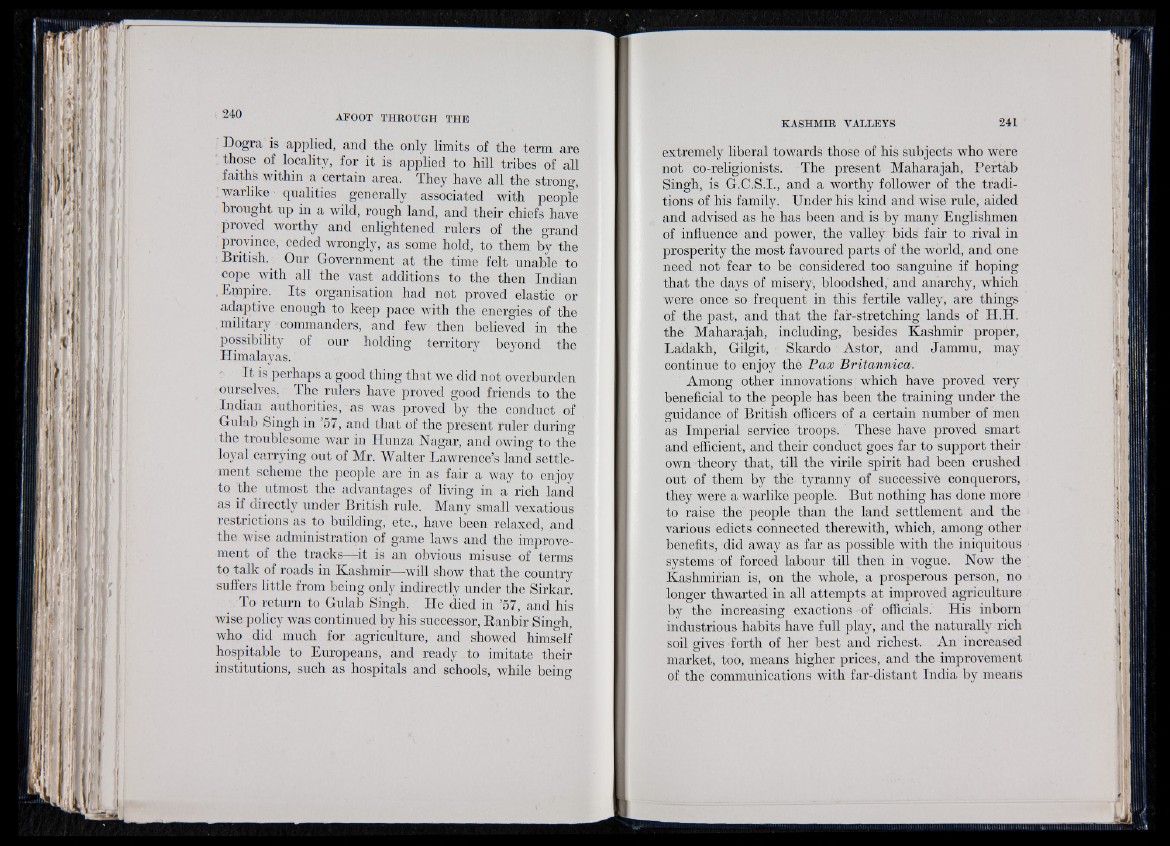
Dogra is applied, and the only limits of the term are
those of locality, for it is applied to hill tribes of all
faiths within a certain, area. They have all the strong,
. warlike ■ qualities generally associated with people
brought up in a wild, rough land, and their chiefs have
proved worthy and enlightened rulers of the grand
province, ceded wrongly, as some hold, to them by the
British. Our Government at the time felt unable to
cope with all the vast additions to the then Indian
.Empire. Its organisation had not proved elastic or
adaptive enough to keep pace with the energies of the
military - commanders, and few then believed in the
possibility of our holding territory beyond the
Himalayas.
I t is perhaps a good thing that we did not overburden
ourselves. The rulers have proved good friends to the
Indian authorities, as was proved by the conduct of
Gulab Singh in ’57, and that of the present ruler during
the troublesome war in. Hunza Nagar, and owing to the
loyal carrying out of Mr. Walter Lawrence’s land settlement
scheme the people are in as fair a way to enjoy
tq the utmost the advantages of living in a rich land
as if directly under British rule. Many small vexatious
restrictions as to building, etc., have been relaxed, and
the. wise administration of game laws and the improvement
of the tracks—-it is an obvious misuse of terms
to talk of roads in Kashmir—will show that the country
suffers little from being only indirectly under the Sirkar.
To return to Gulab Singh. He died in ’57, and his
wise policy was continued by his successor, Ranbir Singh,
who did much for agriculture, and showed himself
hospitable to Europeans, and ready to imitate their
institutions, such as hospitals and schools, while being
extremely liberal towards those of his subjects who were
not co-religionists. The present Maharajah, Pertab
Singh, is G.C.S.I., and a worthy follower of the traditions
of his family. Under his kind and wise rule, aided
and advised as he has been and is by many Englishmen
of influence and power, the valley bids fair to rival in
prosperity the most favoured parts of the world, and one
need not fear to be considered too sanguine if hoping
that the days of misery, bloodshed, and anarchy, which
were once so frequent in this fertile valley, are things
of the past, and that the far-stretching lands of H.H.
the Maharajah, including, besides Kashmir proper,
Ladakh, Gilgit, Skardo Astor, and Jammu, may
continue to enjoy the Pax Britannica.
Among other innovations which have proved very
beneficial to the people has been the training under the
guidance of British officers of a certain number of men
as Imperial service troops. These have proved smart
and efficient, and their conduct goes far to support their
own theory that, till the virile spirit had been crushed
out of them by the tyranny of successive conquerors,
they were a warlike people. But nothing has done more
to raise the people than the land settlement and the
various edicts connected therewith, which, among other
benefits, did away as far as possible with the iniquitous
systems of forced labour till then in vogue. Now the
Kashmirian is, on the whole, a prosperous person, no
longer thwarted in all attempts at improved agriculture
by the increasing exactions of officials. His inborn
industrious habits have full play, and the naturally rich
soil gives forth of her best and richest. An increased
market, too, means higher prices, and the improvement
of the communications with far-distant India by means